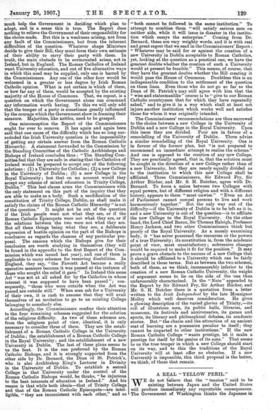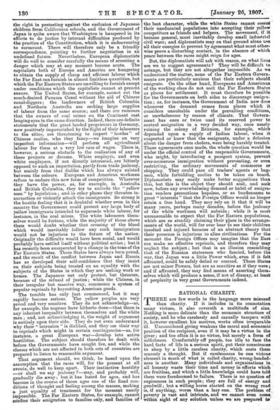A REAL "YELLOW PERIL."
-11-TE do not believe that the " tension " said to be V V existing between Japan and the United States will produce immediately any regrettable consequences. The Government of Washington thinks the Japanese in
the right in protesting against the exclusion of Japanese children from Californian schools, and the Government of Japan is quite aware that Washington is hampered in its efforts to do justice by internal difficulties produced by the practice of the Constitution, which it is endeavouring to surmount. There will therefore only be a friendly correspondence, pointing to further negotiation in an undefined future. Nevertheless, European diplomatists will do well to consider carefully the means of arresting a danger which may at any moment become acute. The capitalists both of Europe and America are hungering to obtain the supply of cheap and efficient labour which the Far East can furnish in almost limitless quantities, but which the Far Eastern States are unwilling to furnish except under conditions which the capitalists cannot at present ensure. The United States, for example, cannot cut the much-desired Panama Canal without the aid of Chinese canal-diggers ; the landowners of British Columbia and Northern Australia are seeking large supplies of labour from the same source ; and there are rumours that the owners of coal mines on the Continent cast longing eyes in the same direction. Indeed, there are definite statements that the great landed proprietors in Germany, now positively impoverished by the flight of their labourers to the cities, are threatening to import "hordes" of Chinese coolies, who they fancy—we imagine on very imperfect information—will perform all agricultural labour for them at a very low rate of wages. • There is, however, a serious obstacle to the realisation of any of these projects or dreams. White employes, and even white employers, if not directly interested, are bitterly opposed to such an importation, partly from trade jealousy, but mainly from that dislike which has always existed between the colours. European and American workmen refuse to endure this new form of competition. Wherever they have the power, as, for example, in Australia and British Columbia, they try to exclude the "yellow men" by legislation and in other places they threaten in- surrection or violently attack the immigrants. So strong is the hostile feeling that it is doubtful whether even in this country the Government could protect any large body of yellow immigrants intended to supersede white labour, for instance, in the coal mines. The white labourers them- selves would be furious, while the majority of those above them would doubt whether that crossing of the blood which would inevitably follow any such immigration would not be injurious to the future of the nation. Originally the difficulty would have been social, and would probably have settled itself without political action ; but it has recently been exasperated by a change in the tone of the Far Eastern States. Those States have always been proud, and the result of the conflict between Japan and Russia has so developed their self-confidence that they insist on their subjects being treated on an equality with the subjects of the States in which they are seeking work or homes. The Japanese not only protest, lint threaten, because of the refusal of justice ; while the Chinese, in their irregular but massive way, commence a system of popular reprisals by boycotting American goods.
The trouble has only just commenced, but it may rapidly become serious. The yellow peoples are very proud and very sensitive. They do not acknowledge—as, for example, the negroes have hitherto done—that there is any inherent inequality between themselves and the white men ; and, not acknowledging it, the weight of argument is entirely upon their side. They do not even understand why their " intrusion " is disliked, and they see their way' to reprisals which might in certain contingencies—as, for instance, a great European war—develop into active hostilities. The subject should therefore be dealt with before the Governments have caught fire, and while the classes which are not affected in both sets of countries are prepared to listen to reasonable argument. That argument should, we think, be based upon the assumption that the races will, for the present at all events, do well to keep apart. Their instinctive hostility —or shall we say jealousy 9—may, and probably will, gradually die away ; but it has lasted for ages, and has become in the course of those ages one of the fixed con- ditions of 'thought and feeling among the masses, making a just equality of treatment for the moment nearly impossible.. The Far Eastern States, for example, cannot confine their emigration to families only, and families of the best character, while the white States' cannot coerce their uneducated populations into accepting their yellow competitors as friends and helpers. The movement, if it became general, must inevitably develop small industrial civil wars; and diplomatists may on that ground alone use all their energies to prevent by agreement what must other; wise prove a disturbing contact, in the absence of which peace between the races might reign for ages.
But, the diplomatists will ask with reason, on what lines are we to suggest agreements ? They will be difficult to ariang,e, but they are not altogether impossible. As we understand the matter, none of the Far -Eastern Govern. manta are particularly anxious that their subjects should emigrate. On the other hand, Europeans and Americans of the working class do not seek the Far Eastern States as places for settlement. It must therefore be possible for the Governments on both sides to discourage emigre. tion ; as, for instance, the Government of India now &Pei whenever the demand comes from places which it considers unsuitable under the prevailing conditions, or unwholesome by reason of climate. That Govern- ment has once or twice used its reserved power to tontrol emigration in a very decided way, once nearly ruining the colony Of Reunion, for example, which depended upon a supply of Indian labour, when it suspected or knew that the emigrants, under a delusion about the danger from cholera, were being harshly treated. These agreements once made, the whole question would be under the official control of the responsible Governments, who might, by introducing a passport system, prevent over-numerous immigration without preventing, or even restricting, the ordinary movements of commerce or shipping. They could pass all traders' agents or bag.' men, while forbidding coolies to be taken on board. Diplomatists may easily make better suggestions than this, but this is the object they should seek, and seek now, before any overwhelming demand or habit of emigra- tion renders precautions hopeless, or' so burdensome to great " interests " that the Foreign Offices would no longer retain a free hand. They may rely on it that it will be many years, perhaps many decades, before the jealousy of the white workmen will subside ; while it is most unreasonable to expect that the Far Eastern populations, which are so steadily claiming their place in the arrange- ments of the world, will for ever bear to see their children insulted and injured because of an abstract theory that their presence is injurious to alien civilisations. For the moment the Foreign Offices may imagine that the East . can make no effective reprisals, and therefore they may neglect the subject ; but that is an illusion resembling that of the Russian statesmen who fancied, before the war, that Japan was a little Power which, even if it felt affronted, could be safely defied or coerced. These States are not minor Powers, but are as sensitive as if they were ; and if affronted, they may find means of asserting them. selves which will produce a sense, if not of dismay, at least of perplexity in very great Governments indeed.























































 Previous page
Previous page